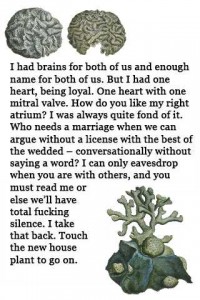After much consideration about how best to sell out, I have decided to become a propagandist for the Raw Foods Movement. I know about the movement, being a “raw foodist.” (That is what we call ourselves.) I can sprinkle my fictional scenes with details that show how a diet of uncooked food dramatically improves health. But how can I make money off my convincing propaganda? This question has sent me to an unlikely place: Charles Dickens’ A Christmas Carol.
Reworking Dickens’ novella, I have created a story that promotes the eating of raw foods while reinforcing the values of the rich. Through the story, which I am offering for free on this website, I want to attract the attention of wealthy raw foodists. Some famous ones include Woody Harrelson, Demi Moore and Carol Alt. The diet generally enjoys more popularity on the West Coast than it does here in the East, probably because of the warmer weather. Cold food seems like a cruel way to go on a snowy night. Also the diet ran into an image problem in New York when one of its proponents and chefs, Dan Hoyt, got caught masturbating on the R train. Surely the raw food way of life could use some good press for the sake of its spas and retreats. I am hoping that a holistic businessperson will find his way to my work and ask me to create more propaganda for the cause.
While I am reluctant to give away my work for free, I am as desperate as author Dubravka Ugresic was a few years back when she offered to put a Miele vacuum cleaner in one of her novels for a price. The offer appeared in 2003 in her collection of essays Thank You for Not Reading. While stating her case, she gave a mini endorsement when she called Miele “the Mercedes of household appliances.” I assume that she received no compensation for the phrase.
I would offer to do product placement myself but want to give more. I must give more. My diet costs a lot, what with all of the produce and the shopping trips. Produce after all has a mere blip of a shelf life compared to pasta and jarred sauce. Furthermore, conditions for fiction writers have declined since Ugresic made her pitch. Recently I read Anne Elizabeth Moore’s Unmarketable: Brandalism, Copyfighting, Mocketing and the Erosion of Integrity and learned of how creative artists are selling out for next to nothing these days. Some product placement here and there won’t cut it in today’s market. Anyway, a few fruits and vegetables thrown around a story would be more messy than illustrative and persuasive; truly I have picked a movement that requires an elaborate sell.
And so without further ado, here is “A Raw Christmas,” a short, fresh story.
A Raw Christmas
The ghost of Jacob Marley enters the bedroom of his old business partner Scrooge. He shakes the chains he is wearing, having forged the links over a lifetime of usury.
Scrooge is bored with the ghost. Having the Mercedes of home entertainment centers [insert brand name here], he is accustomed to vivid illusions. His mind wanders. The poor, blah, blah, blah. The real poor people are in other countries – India, Africa. All of the “poor” in the U.S. are inexcusably fat.
But Scrooge pretends to care. He knows he is in A Christmas Carol. He prides himself on his self-awareness and believes that it — and not acts of generosity — will be his ultimate salvation.
Marley, obviously confusing Scrooge’s boredom with disbelief, says, “You don’t believe in me.”
Scrooge says the line Dickens wrote for him: “I don’t.”
“Why do you doubt your senses?”
Scrooge continues to try to stick to the script: “Because a little thing affects them. A slight disorder of the stomach makes them cheats. You may be an undigested bit of beef, a blot of mustard, a crumb of cheese. There’s more of gravy than of grave about you, whatever you are!”
After Marley leaves, Scrooge realizes that he messed up this line about the gravy and the grave. He forgot to say that Marley could also be “a fragment of an underdone potato.” His mistake ultimately leads him to raw foods. He comes to learn that Marley is not “underdone potato” but overdone. Those ghosts bothering him about 25 percent interest rates on student loans are indeed “more of gravy than of grave.” His digestion is seriously overtaxed from cooked foods.
Scrooge changes his diet and feels better right away. No longer is he bothered by ghosts or, for that matter, thoughts of his first wife. That self-righteous woman had a tongue like a knife when she got home from the soup kitchen. (“Of course you’ve figured out what story you’re in, genius! Your name is Ebenezer Scrooge!”) Now she is a distant memory. She is stuck among the bitter, worrying about “the poor,” while he has moved on. He is healing, his heart having so improved that Viagra is no longer contraindicated in his case.
7.14.2008
